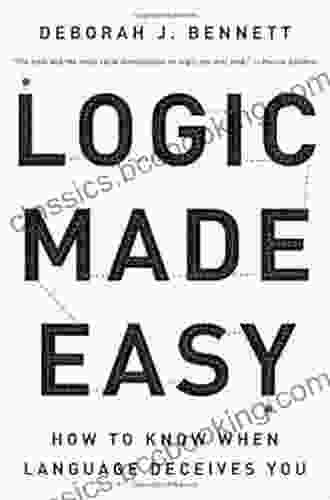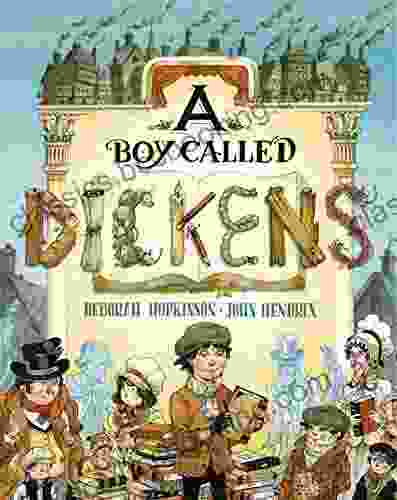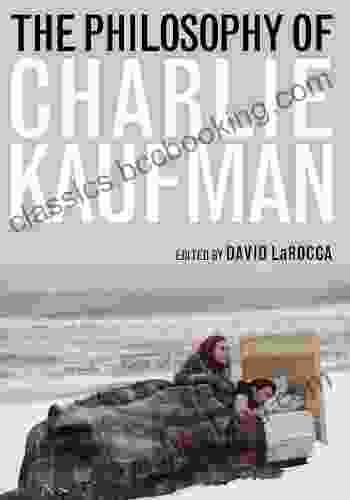The Philosophy of Charlie Kaufman: The Philosophy of Popular Culture

Charlie Kaufman is one of the most acclaimed and original screenwriters working today. His films, which include Being John Malkovich, Adaptation, and Eternal Sunshine of the Spotless Mind, are known for their complex narratives, philosophical themes, and dark humor. In his new book, The Philosophy of Charlie Kaufman: The Philosophy of Popular Culture, Dr. David Kyle Johnson explores the philosophical underpinnings of Kaufman's work.
Johnson argues that Kaufman's films are not simply clever puzzles or exercises in postmodernism. Rather, they are serious works of philosophy that engage with some of the most fundamental questions about human existence. These questions include the nature of reality, the meaning of life, and the possibility of free will.
4.6 out of 5
| Language | : | English |
| File size | : | 1536 KB |
| Text-to-Speech | : | Enabled |
| Screen Reader | : | Supported |
| Enhanced typesetting | : | Enabled |
| Word Wise | : | Enabled |
| Print length | : | 317 pages |
Johnson shows how Kaufman's films explore these questions through a variety of philosophical perspectives, including existentialism, postmodernism, and cognitive science. He also discusses how Kaufman's films reflect the Zeitgeist of our time, a time of uncertainty and anxiety about the future.
The Philosophy of Charlie Kaufman is a must-read for anyone interested in Kaufman's work or in the philosophy of popular culture. Johnson's insightful analysis provides a new understanding of Kaufman's films and their significance in the contemporary cultural landscape.
The Nature of Reality
One of the central themes in Kaufman's work is the nature of reality. His films often explore the idea that reality is not as simple or straightforward as we might think. In Being John Malkovich, for example, the protagonist discovers a portal that allows him to enter the mind of the actor John Malkovich. This raises the question of whether the reality we experience is simply a product of our own minds.
In Adaptation, Kaufman explores the relationship between reality and fiction. The protagonist, a screenwriter, struggles to adapt a non-fiction book into a screenplay. As he does so, he begins to question the line between fact and fiction. He comes to realize that the stories we tell ourselves about the world are just as important as the world itself.
Kaufman's films challenge us to question our assumptions about reality. They suggest that there is no one true reality, but rather multiple realities that are constantly being created and recreated by our minds.
The Meaning of Life
Another major theme in Kaufman's work is the meaning of life. His films often explore the existential question of why we are here and what our purpose is. In Eternal Sunshine of the Spotless Mind, for example, the protagonist undergoes a procedure to erase all memories of his former lover. This raises the question of whether our memories are what define us and give our lives meaning.
In Synecdoche, New York, Kaufman explores the meaning of life through the story of a theater director who creates a massive, immersive play that consumes his entire life. The play becomes a microcosm of the universe, and the director's quest to create the perfect play becomes a metaphor for the human search for meaning.
Kaufman's films do not offer easy answers to the question of the meaning of life. However, they do suggest that the search for meaning is an ongoing process, one that is both challenging and rewarding.
The Possibility of Free Will
A third major theme in Kaufman's work is the possibility of free will. His films often explore the idea that our choices are not as free as we might think. In Being John Malkovich, for example, the protagonist discovers that he can control the actions of others by entering their minds. This raises the question of whether we have any real control over our own actions.
In Adaptation, Kaufman explores the relationship between free will and determinism. The protagonist, a screenwriter, struggles to adapt a non-fiction book into a screenplay. As he does so, he begins to question whether he is truly free to make his own choices or whether his choices are predetermined by the events of his life.
Kaufman's films challenge us to question our assumptions about free will. They suggest that our choices may be more limited than we think and that our actions may be determined by forces beyond our control.
The Zeitgeist of Our Time
Kaufman's films are not simply philosophical exercises. They are also reflections of the Zeitgeist of our time. Kaufman's films capture the uncertainty and anxiety of our time, a time in which we are constantly bombarded with information and in which the future seems increasingly uncertain.
In Being John Malkovich, for example, the protagonist discovers that he can escape the mundane reality of his life by entering the mind of another person. This reflects the desire of many people in our time to escape the pressures of everyday life and to find a more fulfilling existence.
In Adaptation, Kaufman explores the relationship between reality and fiction. The protagonist, a screenwriter, struggles to adapt a non-fiction book into a screenplay. As he does so, he begins to question the line between fact and fiction. This reflects the growing uncertainty in our time about what is real and what is not.
Kaufman's films are a mirror of our time. They capture the hopes and fears of our age and they offer us a way to understand the challenges of living in a complex and rapidly changing world.
Charlie Kaufman is one of the most important and original filmmakers working today. His films are not simply clever puzzles or exercises in postmodernism. Rather, they are serious works of philosophy that engage with some of the most fundamental questions about human existence. These questions include the nature of reality, the meaning of life, and the possibility of free will.
Kaufman's films are also reflections of the Zeitgeist of our time. They capture the uncertainty and anxiety of our time, a time in which we are constantly bombarded with information and in which the future seems increasingly uncertain. However, Kaufman's films also offer us a way to understand the challenges of living in a complex and rapidly changing world.
The Philosophy of Charlie Kaufman: The Philosophy of Popular Culture is a must-read for anyone interested in Kaufman's work or in the philosophy of popular culture. Johnson's insightful analysis provides a new understanding of Kaufman's films and their significance in the contemporary cultural landscape.
4.6 out of 5
| Language | : | English |
| File size | : | 1536 KB |
| Text-to-Speech | : | Enabled |
| Screen Reader | : | Supported |
| Enhanced typesetting | : | Enabled |
| Word Wise | : | Enabled |
| Print length | : | 317 pages |
Do you want to contribute by writing guest posts on this blog?
Please contact us and send us a resume of previous articles that you have written.
 Book
Book Novel
Novel Page
Page Chapter
Chapter Text
Text Story
Story Genre
Genre Reader
Reader Library
Library Paperback
Paperback E-book
E-book Magazine
Magazine Newspaper
Newspaper Paragraph
Paragraph Sentence
Sentence Bookmark
Bookmark Shelf
Shelf Glossary
Glossary Bibliography
Bibliography Foreword
Foreword Preface
Preface Synopsis
Synopsis Annotation
Annotation Footnote
Footnote Manuscript
Manuscript Scroll
Scroll Codex
Codex Tome
Tome Bestseller
Bestseller Classics
Classics Library card
Library card Narrative
Narrative Biography
Biography Autobiography
Autobiography Memoir
Memoir Reference
Reference Encyclopedia
Encyclopedia David J O Brien
David J O Brien David M Kotz
David M Kotz David Aston
David Aston David J Ley
David J Ley David Engel
David Engel David Shoalts
David Shoalts David J Vanbergen Jr
David J Vanbergen Jr David J Rothman
David J Rothman Deborah Ann Davis
Deborah Ann Davis David Chang
David Chang Dean Crisp
Dean Crisp Deanna Kahler
Deanna Kahler Dave Bahr
Dave Bahr David Mura
David Mura David Colbert
David Colbert Davida Hartman
Davida Hartman David L Cook
David L Cook Darren G Davis
Darren G Davis David Ruppert
David Ruppert David Jenyns
David Jenyns
Light bulbAdvertise smarter! Our strategic ad space ensures maximum exposure. Reserve your spot today!

 Jackson HayesImmerse Yourself in the Heartbreaking and Inspiring Journey of "When We Were...
Jackson HayesImmerse Yourself in the Heartbreaking and Inspiring Journey of "When We Were... Yasushi InoueFollow ·6.4k
Yasushi InoueFollow ·6.4k Brady MitchellFollow ·2.9k
Brady MitchellFollow ·2.9k Stephen KingFollow ·16.2k
Stephen KingFollow ·16.2k Mark TwainFollow ·18.9k
Mark TwainFollow ·18.9k Brett SimmonsFollow ·10.6k
Brett SimmonsFollow ·10.6k Ralph EllisonFollow ·19.3k
Ralph EllisonFollow ·19.3k Levi PowellFollow ·13k
Levi PowellFollow ·13k Jared PowellFollow ·14.4k
Jared PowellFollow ·14.4k

 Cameron Reed
Cameron ReedHow to Know When Language Deceives You
Unmasking the Power of...

 Robbie Carter
Robbie Carter50 Things To Know About Planning Home Schooling...
: The Power of Hands-On Learning Embarking...

 Julio Cortázar
Julio CortázarCalculus: Single and Multivariable, 8th Edition — The...
Calculus is the...

 Jaime Mitchell
Jaime MitchellBunnicula and Friends: A Spooktacular Tale of Mystery and...
In the quaint little town of Celeryville,...

 Josh Carter
Josh CarterPeppa Easter Egg Hunt: Join Peppa Pig on an...
Get ready for...

 Donovan Carter
Donovan CarterBoy Called Dickens: A Journey into the Childhood of a...
Delving into the...
4.6 out of 5
| Language | : | English |
| File size | : | 1536 KB |
| Text-to-Speech | : | Enabled |
| Screen Reader | : | Supported |
| Enhanced typesetting | : | Enabled |
| Word Wise | : | Enabled |
| Print length | : | 317 pages |









